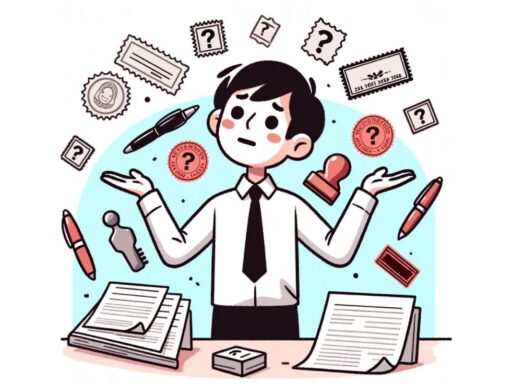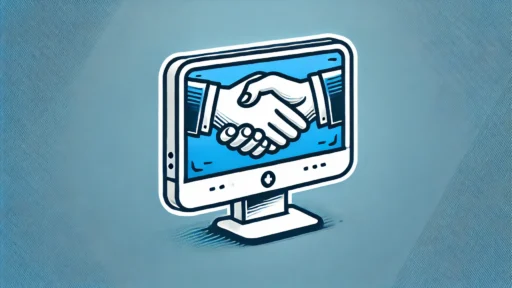Why is a document notarized?
Understanding the ‘Notarized Meaning’ is crucial, as it sheds light on the validation process and the legal significance attached to it.
We’ll explain what it means, why it’s important, and how it adds an extra layer of trust to your important papers.
From buying a house to signing legal documents, notarization ensures everything is legit.
Now, let’s check out when you need it, how to get it done traditionally, and the new wave of convenient online notarization!
What does ‘Notarized Meaning’ Refer To?

Ever seen a document with a fancy stamp and an extra signature that isn’t yours?
That’s what a notarized document looks like. A notary public is an official who checks your ID, sees you sign something, and then stamps the document to prove it’s real.
It’s like having a trusted witness with extra authority to ensure your documents are legitimate.
So, the next time you need to find a “Notary Near Me,” you’ll know exactly what to expect from the process. And that’s the notary public meaning.
Understanding the notarized meaning is crucial for recognizing the authenticity of important documents.
What is the distinction between the notarized meaning and simply being signed?
We’ve all signed documents – it’s just putting your John Hancock on the dotted line.
But notarizing means taking things a step further. It’s like adding a security layer to your signature.
Here’s why:
- Signing just proves it’s you. You put your name on the paper, that’s it.
- Notarization confirms it’s you and you’re signing on your own free will. A notary public, or an official witness, checks your ID to verify you are who you say you are. They also see you sign the document, ensuring no one pressured you.
This extra verification makes documents with a notarized meaning more trustworthy, especially in legal situations.
It adds weight to your signature, like having a trusted person vouch for everything being legit.
Why is a Document Notarized? Understanding the Notarized Meaning
Imagine borrowing a bunch of money from a friend.
A handshake and your word might seal the deal, but for larger sums, you’d probably want something more official, right?
Notarization works the same way for documents. A legal document notary ensures that the signatures on your documents are authentic and that the signers have willingly signed.
Here’s why you might need something notarized:
Adds an Extra Layer of Trust
A notary public acts as a neutral third party, verifying your identity and making sure you signed willingly.
This extra layer of security makes notarized documents more reliable, especially for important matters like:
- Property Transfers: When buying a car or house, notarization ensures everything is on the up and up.
- Affidavits: Sworn statements for legal purposes often require notarization to add weight to your testimony.
- Financial Documents: Loan applications or signing over ownership of assets might involve notarized documents for security.
Deters Fraud
The notarization process discourages forgery and ensures the signer is who they claim to be.
This helps prevent situations where someone might try to use your signature on a document without your knowledge.
In short, notarization adds an official stamp of approval to your documents, making them more credible and trustworthy in situations where that extra layer of security matters.
Understanding Notarized Meaning: When is a Document Notarized?
Not every document needs the official stamp of a notary, but there are some key situations where it’s important.
Here’s when you might encounter a notarized document:
- Real Estate Deals: Buying a house or car? Notarization is common for deeds, mortgage paperwork, and other real estate and property contracts. It adds an extra layer of security to ensure everything is legit during these big financial transactions.
- Legal Matters: Affidavits (sworn statements), powers of attorney (giving someone else the legal right to act on your behalf), and even will often involve notarization. It adds weight to your words and helps ensure they’re truly yours.
- Financial Documents: Loan applications, especially for large sums, or documents transferring ownership of assets like stocks or bonds, might require notarization for added security.
- Government Forms: In some cases, official documents like passport applications or specific government forms may require a notary’s seal to be considered valid. It’s always best to check with the issuing agency to be sure.
It’s important to note that specific requirements for notarization can vary by state or jurisdiction.
If you’re unsure whether a document needs notarization, it’s always best to consult with the relevant authority or seek professional legal advice.
How to Get a Document Notarized?
So, do you have a document that needs the official stamp of approval?
Here’s a breakdown of how to get something notarized:
- Notarized Meaning: Before diving into the process, let’s clarify what “notarized” meaning. Essentially, it involves a certified individual, typically a notary public, verifying the authenticity of a document by witnessing the signing and affixing their official seal or stamp.
- Prepare Your Paperwork: Double-check that your document is complete and ready for signing. Ensure all necessary signatures and seals are in place, and avoid signing beforehand – that happens in front of the notary.
- Find a Notary Public: There are several ways to locate this helpful official. Banks, credit unions, shipping stores, and even courthouses often have notaries on staff. A quick online search for “notary public near me” should provide you with a list of local options.
- Gather Your ID: Don’t forget your valid government-issued identification, such as a driver’s license or passport. The notary will need to verify you are who you claim to be.
- Visit the Notary: Bring your unsigned document and ID to the notary’s office. They’ll verify your identity, have you sign the document in their presence, and then complete the official notarization.
- Expect a Fee: There’s usually a small fee associated with the notary’s service. The cost can vary depending on their location and the complexity of the notarization process.
- Make Copies (Optional): While not always required, consider bringing a photocopy of your document in case the notary needs it for their records.
Save yourself time and ensure a smooth experience by calling the notary public beforehand.
You can confirm their availability, inquire about their fees, and most importantly, make sure they can handle the specific type of notarization you require (jurat or acknowledgment).
Online Notarization
When we talk about ‘Notarized Meaning,’ we’re referring to the legal validation and authentication process conducted by a notary public.
Imagine getting a document notarized from the comfort of your couch.
Online notarization uses video conferencing technology to connect you with a notary public online, allowing them to verify your ID and witness your signature electronically.
This method has grown in popularity, offering a faster and more convenient alternative to the traditional in-person approach.
Understanding the ‘Notarized Meaning’ is crucial in comprehending the legal authentication process.
Benefits of Online Notarization
Convenience and Accessibility
Online notarization is all about convenience! Forget trekking to a notary’s office and squeezing into their schedule.
This lets you get things done from the comfort of your couch, at work, or even on vacation!
Perfect for busy bees, folks in remote areas, or anyone with mobility limitations.
Plus, you can notarize documents anytime, day or night, no more being stuck to traditional office hours.
Speed and Efficiency
Traditional notarization can be a pain – scheduling appointments that take forever.
No, thanks! This is where online notarization shines.
It’s way faster. Instead of waiting days or weeks, many online notary services can connect you with a notary in just minutes.
Enhanced Security
Online notarization might sound too good to be true, but hear this — it’s actually pretty secure!
These platforms use fancy tech (don’t worry, it’s all behind the scenes) to keep your documents under lock and key.
Think of stuff like special codes, scrambled messages, and high-tech vaults to protect your info.
Plus, many online notary sessions are recorded, adding another layer of security and making sure everything is on the up and up.
This way, if there’s a question about your document, you’ll have a clear record of everything. Pretty cool, right?
Online signature generator can also be integrated into the process to facilitate efficient document signing.
Cost-Effective
Online notarization can save you some cash too!
Sure, there might be a fee, but it’s often cheaper than traveling to a notary’s office.
Think about it – no gas money, no parking hassles, and no need to take time off work.
Plus, many online notary services have pretty good prices, and some even offer discounts if you use them a lot (which can be a lifesaver for businesses that frequently require documents with a notarized meaning).
So, online notarization can be a win-win for your wallet and your time!
Challenges of Notarizing Documents Online
Technological Requirements
Online notarization sounds handy, but there are a few tech things to keep in mind.
First, you’ll need a decent internet connection.
If your Wi-Fi cuts in and out a lot, it could mess things up and make you start over.
Also, you’ll need a device with a camera and microphone, like your computer, phone, or tablet.
If you’re not super comfortable with tech, this might not be the best option for you.
Just to be safe, make sure your device is all charged up and working properly before you dive into online notarization. This will help ensure everything goes smoothly.
Legal Recognition
Hold on a second! Online notarization isn’t a sure thing everywhere just yet.
While it’s getting more and more popular, some states or even countries might have their own rules about it, especially for super important documents you might need for court or official stuff.
To avoid any bumps in the road, check with the relevant authorities or institutions beforehand to make sure online notarization and title and escrow is okay for your specific document.
It’s better to be safe than sorry!
Privacy Concerns
Online notarization sounds great, but it’s normal to feel a little uneasy about sharing your info online, especially anything sensitive.
After all, your privacy matters!
The good news is there are online notary services out there that take data protection seriously, following all the privacy laws.
To ease your mind, do some research on the platform you’re considering. Read reviews and see what kind of security measures they have in place.
A little research can go a long way in making you feel confident about using online notarization.
Limited Availability for Certain Documents
Here’s the thing: some documents still need the in-person touch.
This could be because they require witnesses, involve super complex legal stuff, or certain institutions just have old-school rules about how things get done.
Before you get your heart set on online notarization, double-check the requirements for your specific document.
This way, you’ll avoid any hold-ups or headaches down the line. And remember, for added security, consider using an escrow service for sensitive transactions.
Conclusion
Whether you opt for the traditional in-person route or the convenient online method, you’ll be ensuring the validity and trustworthiness of your documents.
Remember, a little notarization can go a long way in safeguarding your important transactions.
Understanding the notarized meaning is essential for grasping the significance of this process.
Check out our next blog post to explore popular online notary services and learn how to choose the right one for you!”
FAQs
Q. Is online notarization legal?
Online notarization is legal and recognized in most US states, but there can be variations by state. It’s always best to check with the relevant authority or institution where you’ll be submitting the notarized document to ensure an online notarized affidavit is acceptable.
Q. How long does the notarization process take?
The traditional in-person notarization process is usually fairly quick, taking around 10–15 Q. minutes. Online notarization can be even faster, often completed in just a few minutes.
Q. How much does it cost to get a document notarized?
The cost of notarization can vary depending on your location, the complexity of the document, and the notary’s fees. Generally, expect to pay between $10 and $20 for a simple notarization. Online notary services may have different pricing structures, so be sure to compare rates before choosing a provider.








